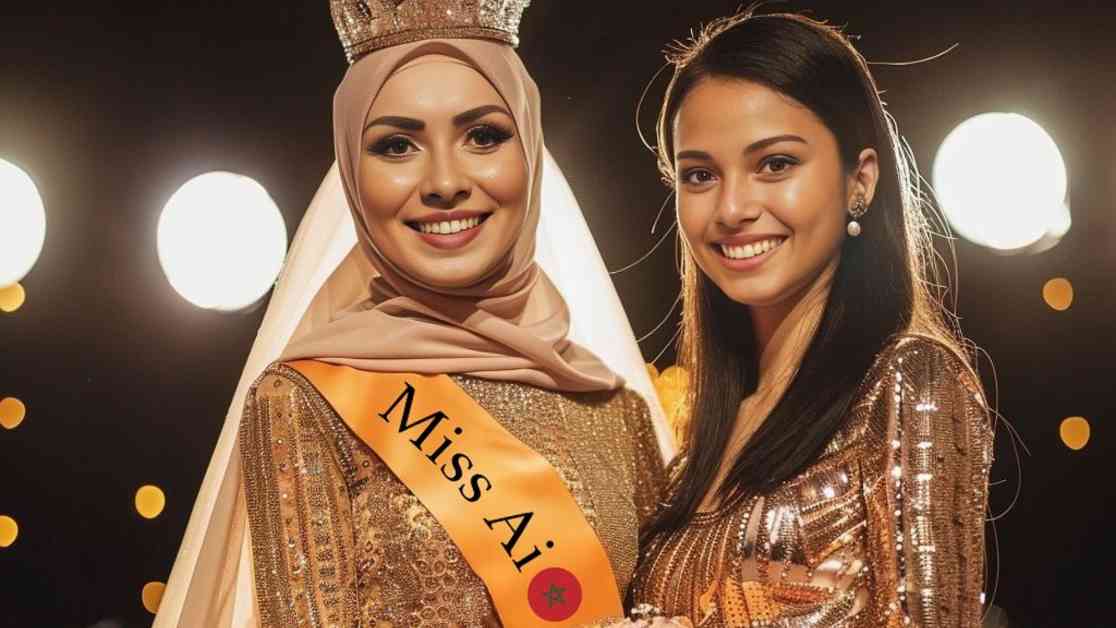An influencer marketing company organized a Miss AI competition to reward the best virtual influencer (whose content is generated by AI). However, just like Miss Universe or Miss France, this competition has sparked criticism about the representation of women by artificial intelligence. Kenza Layli, an AI-generated virtual influencer // Source: Waica
We all know about beauty pageants, virtual influencers, and AI-generated content, so it was only a matter of time before a competition for AI-generated influencers emerged. Fanvue, an influencer platform (a competitor of OnlyFans), organized this competition with the World AI Creator Awards (Waica), whose results have been announced. Unfortunately, the technology does not seem to de-objectify women but rather contributes to it.
A competition to elect the best virtual influencer
The Miss AI competition has finally revealed its results, with over 1500 entries from around the world. The criteria were quite specific: there had to be a major creator behind each virtual influencer, and artificial intelligence had to be used to generate the photos of these influencers. The evaluation criteria were diverse:
Beauty: how « beautiful » the influencer is, as well as open-ended questions;
Technology: how successful the influencer and the AI-generated settings are;
Social influence: how successful the virtual influencer is on social media.
Each influencer was judged in these three categories to receive an overall score. The judging panel included two virtual influencers, a PR professional, and a beauty pageant historian.
The first place went to Kenza Layli, a Moroccan virtual influencer with 207,000 followers on Instagram. In second place, we have Lalina from France, with 122,000 followers on the same social network. Finally, in third place, we have Olivia C, a Portuguese virtual influencer with 13,000 followers on Instagram.
Artificial intelligence also contributes to the objectification of women
The existence of such a competition is not surprising as virtual influencers are becoming more common. The advantage is that unlimited photos can be generated at relatively low costs, placing them in any situation. Sasha Luccionni, a researcher at Hugging Face, stated to Ars Technica: « Another step towards the objectification of women by AI. As a woman working in this field, I am not surprised but disappointed. » According to her, « It is not surprising that AI is used to generate images of what ideal women look like. » On the other hand, Meriam Bessa, CEO and co-founder of Phoenix AI, the company behind Kenza Layli, defended the competition in an interview with L’Opinion: « I am deeply feminist and humanistic. » The Moroccan influencer also mentioned that AI can « challenge norms and create opportunities where there were none before, » as reported by Euronews.
In line with traditional beauty pageants that have been around for 200 years, Miss AI rewarded the most consensual influencers, whether based on beauty criteria or their influence (their success on social media is due to their consensual stance). The statement from supposed Kenza Layli posted on her account reflects this: « As we progress, I am committed to promoting diversity and inclusion in this field, ensuring that everyone has a seat at the table of technological progress. » This illustrates how generative artificial intelligence works: fed with a vast amount of photos, it undoubtedly generates general, consensual images, lacking real creativity.
Furthermore, the competition reinforces unrealistic beauty standards, sometimes concretely with human bodies and faces that do not exist without modifications. According to Margaret Mitchell, an AI ethics researcher at Hugging Face, this exacerbates existing issues with human influencers: selecting what one wants to show and portraying an unrealistic view of reality. This can increase pressure, especially among young women and teenagers, with no « Mister AI » competition in sight.
Behind the AI-generated virtual influencers lies a pornographic industry
The objectification of women’s bodies by this competition goes beyond. Miss AI highlights Fanvue, a platform that allows creators to monetize their audience by offering exclusive content, making it a direct competitor to OnlyFans or Mym. In fact, the AI-generated influencers of the competition, including the judges, benefit from the visibility offered by Instagram and the contest to sell erotic or pornographic photos, just like many other real models on social media.
For example, judges Aitana Lopez and Emily Pellegrini offer such content on Fanvue. The winners, Lalina and Olivia C, also have accounts on Patreon and Fanvue, respectively. Among the top 10 finalists was Aiyana Rainbow, also present on Fanvue.

